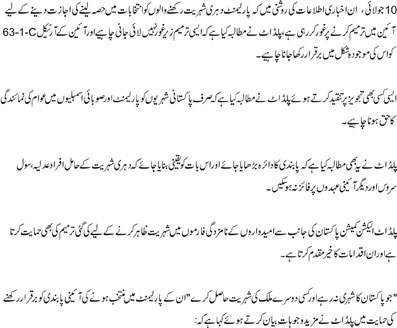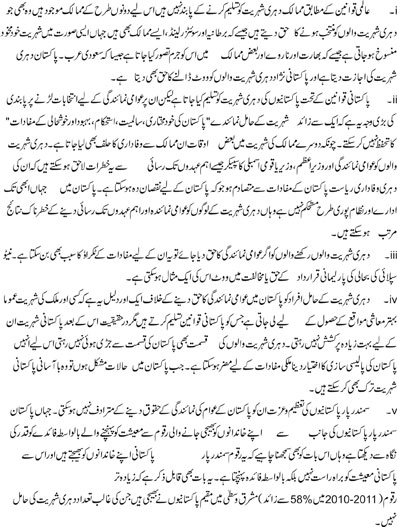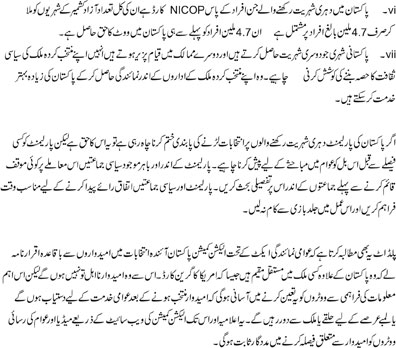|
|
| |
| EVENTS |
|
|
> Parliament must retain Constitutional provision disqualifying foreign/dual nationals for contesting Election: PILDAT
|
|
|
| |
July 10; In view of the news reports that the Parliament may consider amendment to the Constitution to allow for foreign/dual nationals to contest election to become members of Parliament, PILDAT has demanded that such an amendment should not be considered and that article 63-1-c of the 1973 Constitution must be retained in its present form. |
|
| |
Criticising the move, as reported in the media, PILDAT has demanded that only citizens of Pakistan must be qualified to represent the people in the Parliament and Provincial Assemblies of Pakistan.
|
|
| |
PILDAT has also demanded that the bar must be enlarged and legal provisions must also be put in place to ensure that dual nationals can not hold other high public offices such as the Judiciary, civil services, and other statutory positions. |
|
| |
PILDAT also supported and lauded the recent steps undertaken by the Election Commission of Pakistan that amended the Nomination Forms for candidates to declare their status of nationality. |
|
| |
Outlining the reasons for retaining the Constitutional bar on being elected or chosen as, and from being, a member of the Parliament for those who either �cease to be the citizens of Pakistan or acquire the citizenship of a foreign state,� PILDAT has stated that: |
|
| |
-
Under international law, countries are not obliged to recognize dual nationality. Therefore, we have countries at either end of the spectrum: those that grant the right to dual nationals to become elected representatives while holding another passport for instance, UK and Switzerland, to those who automatically revoke the citizenship on such grounds such as India and Norway to even imposing criminal sanctions (Saudi Arabia). Pakistan is tolerant of dual nationality, allowing the right to vote to dual nationals of Pakistani origin.
While the due recognition and respect is granted to dual nationals of Pakistani origin under Pakistani law, the raison d��tre behind placing a Constitutional bar on their election as public representatives is that multiple citizenships is likely to hamper the performance of the public representatives� duty in the �interest of the sovereignty, integrity, solidarity, well- being and prosperity of Pakistan.� [1] Since citizenship of other countries sometimes requires oath of allegiance to those countries, allowing dual nationals to become public representatives, and in essence hold high offices such as that of the Prime Minister, Ministers or even Speaker of the National Assembly, runs the risk of allowing those as having dual loyalty with the potential to act contrary to the interests of the State of Pakistan. With Pakistan�s nascent systems, this can be extremely counter-productive. A conflict of interest can also arise for dual nationals if they are allowed to be public representatives. Voting for or against a Parliamentary resolution on NATO supply routes is a case in point. Another argument against allowing dual nationals to become public representatives in Pakistan is that nationality of another country is usually obtained as a convenient means of attaining improved economic opportunity, which Pakistani law recognises. In essence, however, it trivializes what it means to be a citizen of Pakistan. Dual nationals� fate is not tied to the fate of Pakistan and therefore allowing them to be put in the driving seat of making policy decisions of Pakistan can be detrimental to the interests of Pakistan. When the going gets tough in Pakistan, Pakistani citizenship can be just as easily discarded when it is no longer beneficial. Legitimate recognition for the role of overseas Pakistanis and their respect can not be synonymous with granting them with a right to represent the people of Pakistan. While Pakistan deeply appreciates the indirect support to the economy by remittances overseas Pakistanis send to their families back-home, it needs to be understood that remittances are NOT a direct contribution to the economy of Pakistan but are essentially meant for the families of overseas Pakistanis and Pakistan�s economy is an indirect beneficiary of that. It must also be noted that mainly (over 58 % in 2010-11) remittances are sent from Pakistanis residing in the Middle East, a vast majority of whom are NOT dual nationals. Pakistanis living overseas, dual nationality holders and those residing in the AJK together constitute only 4.7 million voting adults according to the number of NICOP holders at present. These 4.7 million already have a right to vote in Pakistan. Pakistani citizens that obtain a second nationality and become residents of other countries must devote their energies towards assimilating in the political culture of their adopted countries. They can serve Pakistan much better when they are represented in institutions of their adopted countries. |
|
| |
If the Parliament of Pakistan wishes to reconsider the bar on dual nationals to contest election, it is well within its right to do so but given the strongly held positions in Pakistan on this issue, the Parliament must refer the debate to the public before any decision. Political Parties represented in the Parliament and those outside Parliament must discuss the issue threadbare internally before they take a position on the issue. Parliament and political parties should give sufficient time to build a consensus on the issue and not hurry the process. |
|
| |
PILDAT has also demanded that, as provided under the Representation of People Act, the ECP should initiate the formal process for candidates in the next General Election to declare if they hold the status of permanent residence, such as the US green card, in any country other than Pakistan. While the permanent residence status may not disqualify any candidate, the availability of this information is important for voters who can determine on the basis of this information whether a candidate, once elected, will be available to serve the public or stay away from the constituency or the country for an extended period of time. Such public declaration and the availability of this information to public and media through the ECP website, ahead of the day of General Election, will be greatly helpful to the voters in deciding about the suitability of a candidate in the election. |
|
| |
[1] Oath of Office of the Member of National Assembly or Member of Senate, Third Schedule, Constitution of the Islamic Republic of Pakistan, as amended on February 27, 2012. |
|
| |
|
|
| |

|
|
| |
|
|
| |

|
|
| |
|
|
| |

|
|
| |
|
|
| |

|
|
|
|
|
|
|
|
|